Imagine a world where dental visits are no longer filled with anxiety and uncertainty. A realm where technology meets oral health, paving the way for more efficient diagnoses and personalized treatments. Welcome to the future of dentistry—Nerovet AI Dentistry. This innovative approach harnesses artificial intelligence to transform traditional practices into cutting-edge experiences. As we delve deeper into this exciting frontier, you’ll discover how Nerovet AI is not just enhancing patient care but also redefining what it means to be a dental professional in today’s fast-paced environment. Buckle up as we explore the remarkable benefits, real-life success stories, and challenges that come with integrating AI into dental practices!
What is Nerovet AI Dentistry?
Nerovet AI Dentistry represents a groundbreaking fusion of artificial intelligence and dental care. This innovative system uses advanced algorithms to analyze patient data, detect oral conditions, and suggest tailored treatment plans.
At its core, Nerovet AI focuses on enhancing diagnostic accuracy. By processing vast amounts of information quickly, it aids dentists in identifying issues that may go unnoticed during routine examinations.
The technology is designed not just for efficiency but also for precision. With its machine learning capabilities, Nerovet can adapt and improve over time as it gathers more data from various cases.
This approach empowers dental professionals to make informed decisions while ensuring patients receive the best possible care. The result? A smarter way to manage oral health that combines human expertise with cutting-edge technology.
The Benefits of Using AI in Dental Practices
The integration of AI in dental practices brings numerous advantages. One significant benefit is enhanced diagnostic accuracy. AI algorithms analyze images and data faster than the human eye, leading to earlier detection of issues like cavities or periodontal disease.
Efficiency also sees a boost. With automated scheduling and patient management systems, dental teams can minimize administrative burdens. This allows them more time to focus on patient care.
Moreover, personalized treatment plans become feasible through AI analysis of individual patient history and preferences. Tailored approaches improve outcomes and patient satisfaction.
Additionally, predictive analytics helps practices anticipate trends in oral health within their community, enabling proactive measures rather than reactive treatments.
Cost-effectiveness arises as streamlined operations reduce overhead costs while improving service delivery quality.
How Does Nerovet AI Work?
Nerovet AI operates by leveraging advanced algorithms and machine learning to analyze a wide range of dental data. This technology processes patient records, diagnostic images, and treatment histories.
By integrating this information, Nerovet AI can identify patterns and predict potential oral health issues before they escalate. It assists practitioners in making informed decisions about diagnoses and treatment plans.
The system continuously learns from new data inputs, enhancing its accuracy over time. As it encounters diverse cases, it refines its recommendations based on successful outcomes.
Moreover, Nerovet AI provides real-time insights during procedures. Dentists can access crucial information instantly, improving efficiency in the chair while ensuring optimal patient care.
This synergy between human expertise and artificial intelligence creates a more proactive approach to dentistry that benefits both professionals and patients alike.
Case Studies: Success Stories of Using Nerovet AI in Dental Practices
Dental clinics around the globe are experiencing remarkable transformations thanks to Nerovet AI. One standout case involved a practice in Toronto that integrated this innovative technology into their diagnostic process.
Before using Nerovet AI, dentists often struggled with identifying subtle indicators of oral diseases. After implementing the system, they reported a 30% improvement in early detection rates for cavities and gum disease.
Another compelling example comes from a clinic in San Francisco. They utilized Nerovet to enhance patient communication about treatment options. The software generated personalized reports that outlined procedures and costs, helping patients make informed decisions more easily.
Feedback from both dental professionals and patients has been overwhelmingly positive. Dentists appreciate the additional insights while patients feel more engaged in their care journey. This combination fosters trust and satisfaction within dental practices utilizing Nerovet AI technology effectively.
Challenges and Limitations of Implementing AI in Dentistry
Implementing Nerovet AI in dentistry isn’t without its hurdles. One major challenge is the integration with existing systems. Many dental practices use outdated software that may not mesh well with advanced AI solutions.
Training staff to effectively utilize these technologies can also pose difficulties. There’s a learning curve, and some practitioners might resist change due to comfort with traditional methods.
Data privacy concerns are paramount too. Handling sensitive patient information requires stringent security measures, which can complicate implementation processes.
Moreover, there’s the issue of cost. Investing in AI technology can be significant upfront and might deter smaller practices from adopting it.
Regulatory barriers exist as well. Navigating compliance within healthcare regulations adds another layer of complexity for dental providers interested in incorporating AI into their services.
Future Implications and Possibilities for Nerovet AI Dentistry
The future of Nerovet AI dentistry holds remarkable potential for transforming oral health care. With advancements in machine learning, we can expect more personalized treatment plans tailored to individual patient needs.
As data collection improves, AI will enhance predictive analytics. This could lead to early detection of dental issues before they escalate into serious problems. Imagine a world where routine check-ups are streamlined through real-time diagnostics powered by AI insights.
Integration with telehealth platforms may also become commonplace. Patients could receive consultations and follow-up care remotely, increasing accessibility for those in underserved areas.
Moreover, the collaboration between dentists and AI systems can foster continuous learning within the profession. Dentists will be empowered with potent tools that augment their expertise, enhancing decision-making processes during treatments.
Innovations like these pave the way for an era of proactive dental care focused on prevention rather than reaction—revolutionizing how we approach oral health altogether.
Conclusion
Nerovet AI dentistry represents a significant leap forward in the realm of oral health care. By integrating artificial intelligence into dental practices, we can expect not only improved diagnostic accuracy but also enhanced patient experiences. The ability to analyze data swiftly and effectively allows dentists to make more informed decisions.
The benefits are compelling. AI brings efficiency, precision, and predictive capabilities that traditional methods may lack. From streamlining administrative tasks to enhancing treatment plans tailored for individual patients, the implications are vast.
Real-world case studies demonstrate successful implementations of Nerovet AI in various dental settings. These examples illustrate how technology enhances clinical outcomes while fostering patient trust through transparency and engagement.
However, challenges remain in adopting these innovations widely within the industry. Issues such as training staff, managing costs, and ensuring compliance with regulations need careful consideration.
Looking ahead, the potential for Nerovet AI is exciting. As advancements continue and solutions evolve, we may see even greater integrations of technology into everyday practice—ultimately leading to healthier smiles across communities everywhere. The future holds promise for an era where dentistry becomes more proactive rather than reactive—a shift that could redefine our approach to oral health entirely.
Embracing Nerovet AI dentistry today paves the way for tomorrow’s breakthroughs in dental care—making it an essential consideration for practitioners dedicated to advancing their practice amidst a rapidly changing landscape.















